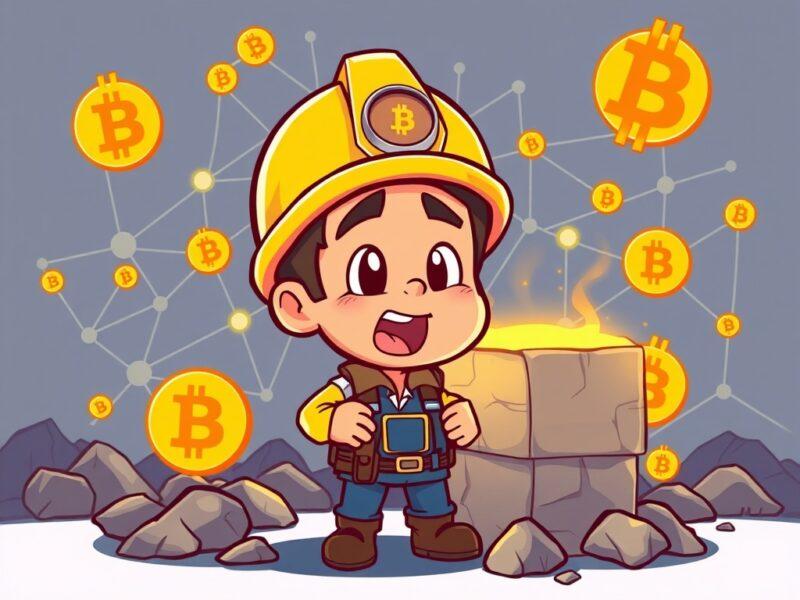Solo Bitcoin Mining Miracle: Miner Strikes Gold with 3.16 BTC Block Reward
Imagine hitting the prize against astronomical odds, not in a lottery game, but in the digital world of cryptocurrency. This is precisely what happened recently when a dedicated individual achieved the near-impossible: a solo miner successfully mined a Bitcoin (BTC) block, securing an incredible 3.16 BTC. This amazing feat, recorded at block height 907,465 on July 28, according to blockchain explorer Mempool, resulted in a reward valued at approximately $377,500. It’s a moment that highlights the sheer unpredictability and tremendous potential rewards within the world of Solo Bitcoin Mining, inspiring many enthusiasts and demonstrating that sometimes, against all odds, a single miner can indeed strike digital gold.
What Exactly is Solo Bitcoin Mining?
In the vast and competitive landscape of cryptocurrency, Solo Bitcoin Mining stands out as a high-stakes endeavor. Unlike most miners who join large mining pools to combine their computational power and share rewards, a solo miner operates independently. This means they dedicate their entire hash rate to finding a block by themselves, aiming to keep the entire block reward.
How Does Bitcoin Mining Work and Why is it So Difficult?
Bitcoin mining is the process of adding new transactions to the Bitcoin blockchain. Miners use powerful computers to solve a complex computational puzzle through Proof-of-Work (PoW). The process involves transaction confirmation, puzzle solving to find a ‘nonce,’ block discovery, and reward distribution. The network’s total hash rate, dominated by specialized ASIC miners, makes solo mining extremely challenging.
What are the Astronomical Chances Against a Solo Bitcoin Miner?
The odds of a solo miner finding a block are extremely slim, akin to winning a lottery. The network’s immense hash rate means individual miners have negligible chances of success, making solo mining more about luck and perseverance than a viable strategy.
Why Do Miners Still Attempt Solo Bitcoin Mining?
Despite the overwhelming odds, some miners pursue solo mining for the chance to earn the full block reward and support Bitcoin’s decentralization. While pooled mining offers more consistent but smaller payouts, solo miners see the allure of potentially life-changing rewards and ideological contributions to the network.
Challenges and Threats of Solo Bitcoin Mining
Solo mining presents challenges such as high upfront costs, significant electricity consumption, heat and noise generation, low probability of success, hardware failures, and market volatility. These obstacles often lead miners to join pools for more stable returns.
The Extraordinary Solo Bitcoin Mining Success Story
The recent success of a solo miner with a 3.16 BTC block reward, defying astronomical odds, underscores Bitcoin’s decentralized nature and the possibility for individual contributions to the network’s security and success.
What Does This Mean for the Future of Bitcoin Mining?
While solo mining remains a high-risk venture, success stories like this fuel optimism and highlight Bitcoin’s accessibility to all participants, regardless of their computational power. It reinforces the decentralized principles and innovative spirit of the Bitcoin network.
Conclusion: The Enduring Appeal of Solo Bitcoin Mining
The solo miner’s exceptional achievement is not just a headline but a narrative of ambition, determination, and occasional digital serendipity in the cryptocurrency world. It symbolizes the ‘digital gold rush’ where computational power meets rare chances of success, inspiring individuals to pursue their mining dreams despite the odds.
Frequently Asked Questions (FAQs) About Solo Bitcoin Mining
Q1: Is Solo Bitcoin Mining profitable for most people?
A1: Solo mining is unlikely to be profitable for many due to high costs and low success rates.
Q2: What is the main difference between solo mining and pooled mining?
A2: Solo mining involves individual efforts, while pooled mining combines resources for shared rewards.
Q3: How much Bitcoin does a miner receive for finding a block?
A3: Miners receive the block subsidy and transaction fees, with solo miners keeping the full reward.
Q4: What equipment is needed for Solo Bitcoin Mining?
A4: Powerful ASIC miners are essential for any chance at solo mining success.
Q5: Are there easier cryptocurrencies to solo mine?
A5: Some smaller cryptocurrencies may offer better solo mining opportunities but with lower potential rewards.
Q6: How does solo mining impact Bitcoin’s security?
A6: Solo mining contributes to the network’s security and decentralization, reinforcing Bitcoin’s robustness.
Share this remarkable solo mining story with fellow enthusiasts and explore the latest developments shaping Bitcoin’s institutional adoption.


